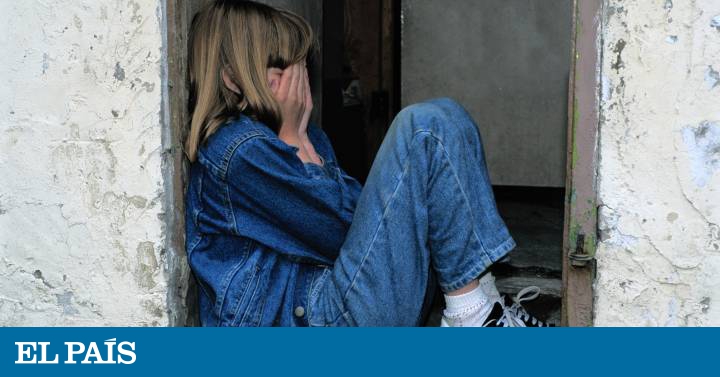MORE INFORMATION
Adolescents, rebels with a cause
How parents' fights affect children
-I don't like you calling me that!
-But if it's just a joke! You get mad about nothing.
-Well, it makes me feel very small.
Javier remembers how in his school stage he was often labeled by his classmates and teachers as the class brain because he was passionate about reading and creating stories. Also how he felt when he failed to achieve a good result in math class and the feeling of not living up to what others expected of him invaded him.
Raquel was conscious many years after she left basketball at the end of the school stage tired of hearing "how clumsy and slow you are."
It was a relief for Maria to get off the crazy goat label that she carried throughout her youth. She had to finish her Medicine degree with an excellent grade so that others began to look at her differently and take her seriously.
Marcos managed to discover, along with his psychologist, that his problems with food were closely related to having carried the nickname of chubby during his childhood and youth .
We live in a society full of stereotypes that can diminish us. We have a bad habit of labeling people as goods, the tendency to pigeonhole people to define them. We are inclined to categorize beliefs, behaviors, attitudes, or situations without regard to what to put a label is to define and to a great extent limit what is labeled.
We all have labels hanging, anyone could recognize themselves in one. They put them at home, at school, on sports teams, and even people who don't even know us. "Donkey, nerd, junk or disaster" could be some of the most used. Many times it is not done to hurt but they end up becoming a difficult burden to manage.
I remember how small those labels that were being given to me ended up conditioning my behavior, my way of looking at the world, the way of loving me. Simple words that often scratched my self-esteem, conditioned my decisions, loaded my backpack with buts . Words that made me feel that I always disappointed someone, that sometimes I didn't measure up to the perspectives they put on me and that I didn't quite fit in.
How little are we aware of the damage caused by labels! Subjective opinions that often pigeonhole us, paralyze us, uselessly bind us to expectations that suffocate us. That they wrongly sculpt us inside, that they magnify our defects, that they clumsily define us and make us forget our strengths and aspirations.
The American psychologist Martin Seligman, in the eighties, developed the theory of learned helplessness where he described that people who are subjected to negative comments or evaluations end up behaving as they are categorized. The child who is labeled as “poorly able” will end up behaving according to the opinions of that label.
When we repeatedly name a child in a negative way, he will end up assuming that he is like that and not that his actions or actions are. Expectations that will greatly condition your behavior and personality, that will damage your self-esteem and identity, that will cause you to develop a feeling of inferiority.
I wish we were able to EDUCATE WITHOUT LABELING, without cataloging our little ones according to their abilities, difficulties or their level of intelligence. Without naming behaviors, the way of acting or feeling. Without value judgments that limit trying things without fear, that mark the character, that diminish confidence or illusion.
I wish we dads, moms and teachers were aware of the enormous impact that our words have on the capacity and performance of our little ones. That all labels, whether positive or negative, make a dent in the heart. Judgments we make without respecting rhythms for learning, ways of doing things, ways of seeing the world.
We are able to ensure that our little ones can look in the mirror without filters that condition them, without labels that remind them of their defects or difficulties, without marks that magnify the fear of failure.
Let us educate from acceptance, trust and respect. Always offering a positive image of them. Making them feel that we accompany them without condition no matter what happens, whatever they do, whether or not they achieve their goals.
Being able to maximize the capacities and aspirations, reinforcing the weaknesses with care and respect and also with demand, empathizing with the stumbling blocks with sweetness and patience.
Ensuring that they know that we love them regardless of their achievements, mistakes or shortcomings. That we are at your side for everything you need no matter what happens. Let's share with them what we are not good at.
Let's make them feel understood and listened to, giving them the opportunity to make mistakes as many times as necessary, encouraging them to start from scratch feeling that each sunrise represents a new opportunity. Teaching them to communicate assertively and to handle each of their emotions with confidence.
Let's help them establish a profile of their strengths and weaknesses, of their learning needs and preferences, of their mastery levels. Let's educate WITHOUT LABELS, teaching them to choose what they really want to be, give them opportunities for success without boxes that make them vulnerable and small.
* Sonia López Iglesia is an educational psychologist, teacher and educator of families and teaching teams. Expert in emotional education and communication. In love with the teenage stage.
You can follow De mamas & de papas on Facebook, Twitter or subscribe here to the Newsletter.

